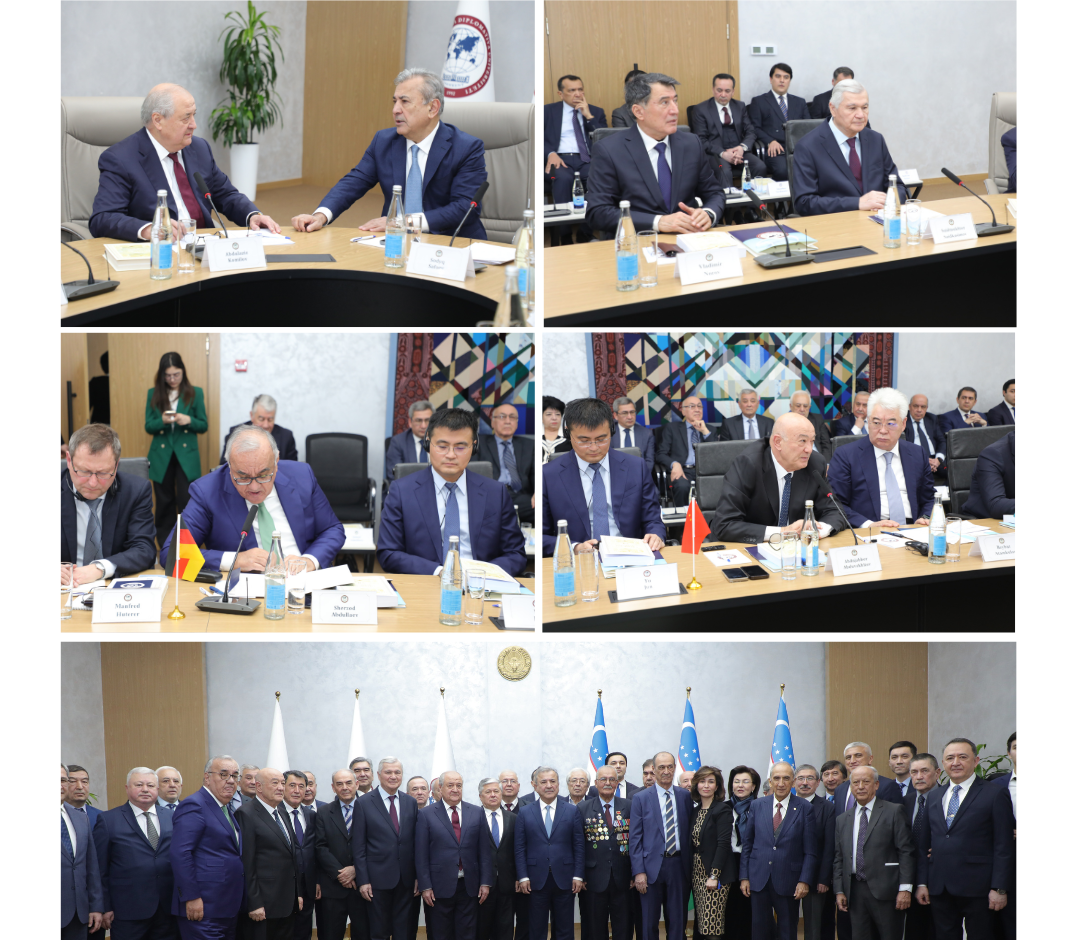
On 30 January, the University of World Economy and Diplomacy hosted the presentation of the book “History of Diplomacy of Uzbekistan”, created by an authoritative team of distinguished scholars and experienced diplomats of the country. The event brought together a wide range of participants, including academics, representatives of the government and diplomatic corps, as well as UWED students.
Opening the ceremony, First Deputy Chairman of the Senate of the Oliy Majlis, Rector of UWED Sadyk Safoev noted the importance of historical perspective for understanding the country’s development. He emphasised the need to preserve and pass on the diplomatic heritage reflecting centuries-old traditions of the Uzbek people. In his opinion, a sign of a new era in the history of Uzbekistan’s diplomacy is the emergence of the concept of parliamentary diplomacy, which is increasingly becoming a tool for achieving practical results of inter-parliamentary interaction in the period of rapid transformations in the world arena, which requires an appropriate reflection on the conduct of foreign policy.
Abdulaziz Komilov, editor-in-chief of the publication and Special Representative of the President of Uzbekistan on Foreign Policy Issues, presented the main ideas of the book. He stressed that the work was created on the initiative of the head of state to study the historical roots and peculiarities of Uzbek diplomacy in the period of independence. According to him, the publication gives a holistic view of the country’s foreign policy in the context of complex international and regional development. At the same time, he highlighted key areas of diplomacy of New Uzbekistan.
Continuing the presentation, First Deputy Foreign Minister of Uzbekistan Bakhrom Aloev noted that the publication dedicated to the history of Uzbek diplomacy has been published for the first time in the country and serves as an important guide for foreign policy specialists. According to him, the book brings together many historical sources and confirms the significance of these traditions, presented to the general public in such a format for the first time. “Diplomacy is not just a profession, but an art that requires special qualities”, he said, expressing a proposal to include the publication in the curriculum of the University of World Economy and Diplomacy.
Director of the Tashkent branch of MGIMO Abdujabbor Abduvakhitov noted that a new methodology and civilisation-dynastic approach to periodisation of the country’s history were developed in creating the “History of Diplomacy of Uzbekistan”. The book reveals the foreign policy component of Uzbek statehood. He suggested publishing this volume separately, expanding it into several books, and publishing it in Russian and English.
Sherzod Abdullaev, Director of the Institute for Advanced International Studies at UWED, who acted as one of the co-authors and made a fundamental contribution to the book, noted that this monograph reveals the key stages of Uzbekistan’s international relations and diplomacy from antiquity to the present day, analysing complex historical processes. “Times have changed, one era was replaced by another, but the peoples of Central Asia have preserved their identity, culture, loyalty and resilience. All this has given uniqueness and uniqueness to the ties of the peoples of the region, and testifies to their underlying strength and potential to maintain peace, stability and prosperity”, he emphasised. Professor Abdullaev noted that this work is the first attempt to comprehensively and systematically comprehend and cover the history of Uzbek diplomacy as a phenomenon. It reflects the current state of science, but the study of this important topic is just beginning.
Ambassador Extraordinary and Plenipotentiary of Kazakhstan to Uzbekistan Beibut Atamkulov read out the congratulatory message of Deputy Chairman of the Senate of Kazakhstan Zhakip Asanov, who noted that the book will make an important contribution to the fund of scientific research literature. The ambassador emphasised that the book is not only a chronicle of the past, but also a bridge between the past and the future, demonstrating the role of diplomacy in the development of international ties in the region.
In turn, Alisher Agzamkhodjaev, Ambassador Extraordinary and Plenipotentiary of the Republic of Uzbekistan to the Republic of Türkiye, noted that Uzbek diplomacy of recent years has inspired American and Turkish specialists, while President Shavkat Mirziyoyev’s rational foreign policy has strengthened cooperation and stabilised the situation in Central Asia.
Co-author Shokhista Ulijanova revealed the essence of Amir Temur’s diplomacy, which played a key role in ensuring peace, stability, international trade and security in Eurasia. She said the diplomacy of independent Uzbekistan rests on a solid historical foundation, where the Temurid legacy plays an important role. It is rooted in the basic principles of modern foreign policy – deep, mutually beneficial co-operation across Eurasia and the development of international trade and technology exchange.
Akmal Saidov, Director of the National Centre for Human Rights, made the final remarks, noting the methodological novelty of the publication, which incorporates a civilisational approach to the history of diplomacy. He stated the practical necessity of using the publication as a textbook-textbook for training new cadres of internationalists.
At the end of the event, the participants paid special attention to the fact that given the vast array of materials and the new dynamics of modern Uzbek diplomacy, the research work in this direction should be continued with the prospect of publishing new, supplemented editions of the book “History of Diplomacy of Uzbekistan”.